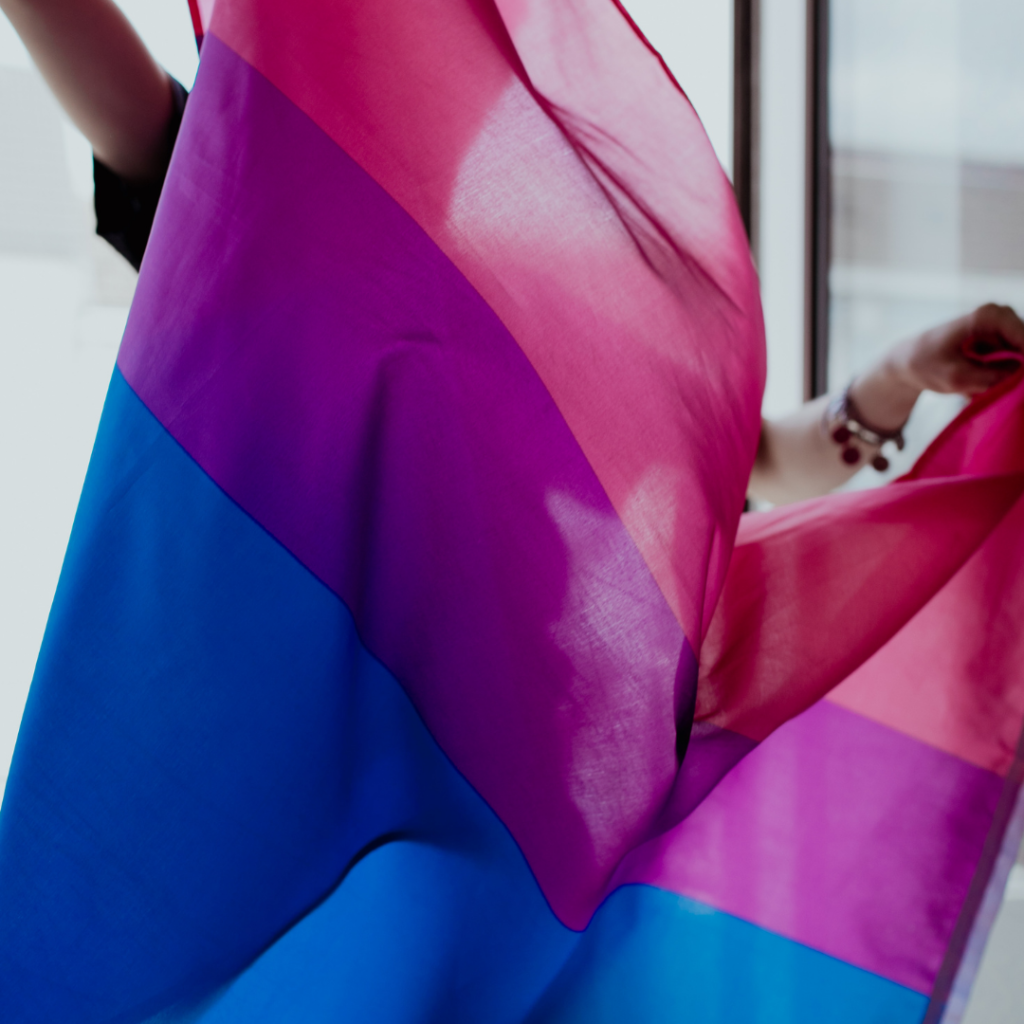
Bi-Visibility Day 2021 has been held annually since 1999. Today marks the end of Bisexual Awareness Week, which took place this year between September 16th-23rd 2021. It is intended to raise both awareness and create visibility for bisexual people, their concerns, and experiences of discrimination. Bisexuality is also often used as an umbrella term for various bi-identities. These include, for example, bisexuals, bicurious persons, pansexuals, polysexuals, multisexuals, and omnisexuals.
The term bisexuality is formed from the Latin word “bi” (meaning “two”) and stands (literally and in binary terms) for interest in one’s own gender as well as the opposite gender. Nowadays, with the progressive dissolution of the binary norm through non-binary gender identity and other expressions of gender, there have long been discourses about how binary this sexual orientation should really be seen. It is important that each bisexual defines bisexuality for themselves, including, for example, non-binary or trans* people. As an overall definition it can be stated that bisexuality describes the attraction to two or more genders.
The symbolism behind the colors of the bisexuality flag:
- Pink represents both emotional and sexual attraction to the same gender.
- Purple stands for the “overlap,” the symbolism for interest in two or more genders.
- Blue represents the emotional as well as sexual attraction towards the opposite gender.
INTERVIEW WITH PROUT EXECUTIVE DR. FOLMA KISER, DIRECTOR AT BAYER AG
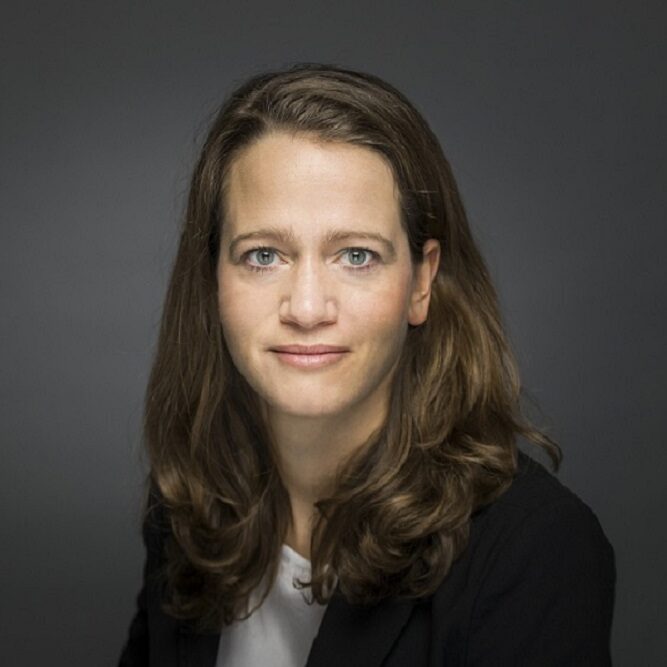
What formative experiences related to your bisexuality have you had (in the workplace)?
To be honest, few. Surprised faces is perhaps one thing and complete silence another. But a really great experience was when a colleague told me that he now dares to be open about his sexuality. He saw me on the PROUTExecutives list and is convinced that you can live your identity openly at Bayer and still have a career. That has encouraged him a lot.
How is the topic of bisexuality addressed in your workplace?
Sexuality is generally not addressed, except in the internal LGBT*IQ network BLEND and marginally in the topic of D&I.
What challenges do you face as a bisexual person or what stereotypes do you face?
I see myself less confronted with challenges as a bisexual person but more as a rainbow family in general. You can see that, for example, the terms “gay”, “lesbian” and “bi” are still used as swear words in schoolyards (and not only there) and also educators and teachers avoid the topic of LGBT*IQ and inclusion in general. Social acceptance is still difficult when the major democratic parties react here only half-heartedly. The pressure on other countries like the G7 is also not there, so same-sex marriages are not recognized in all G7 states. My wife did not even get a “residence status” in Japan, whereas our children and I got it during our stay.
What else would you have wished for your coming out?
For me, that was still at the beginning of the Internet era, more networked groups would have been great here. I think that the information available and networks in general are much better today. And also if the topic LGBT+ had been on the curriculum at school – then everyone who is not hetero-cis would have had an easier time understanding their identity.
STATEMENTS BY ACCENTURE EMPLOYEES ON THEIR EXPERIENCES WITH BISEXUALITY
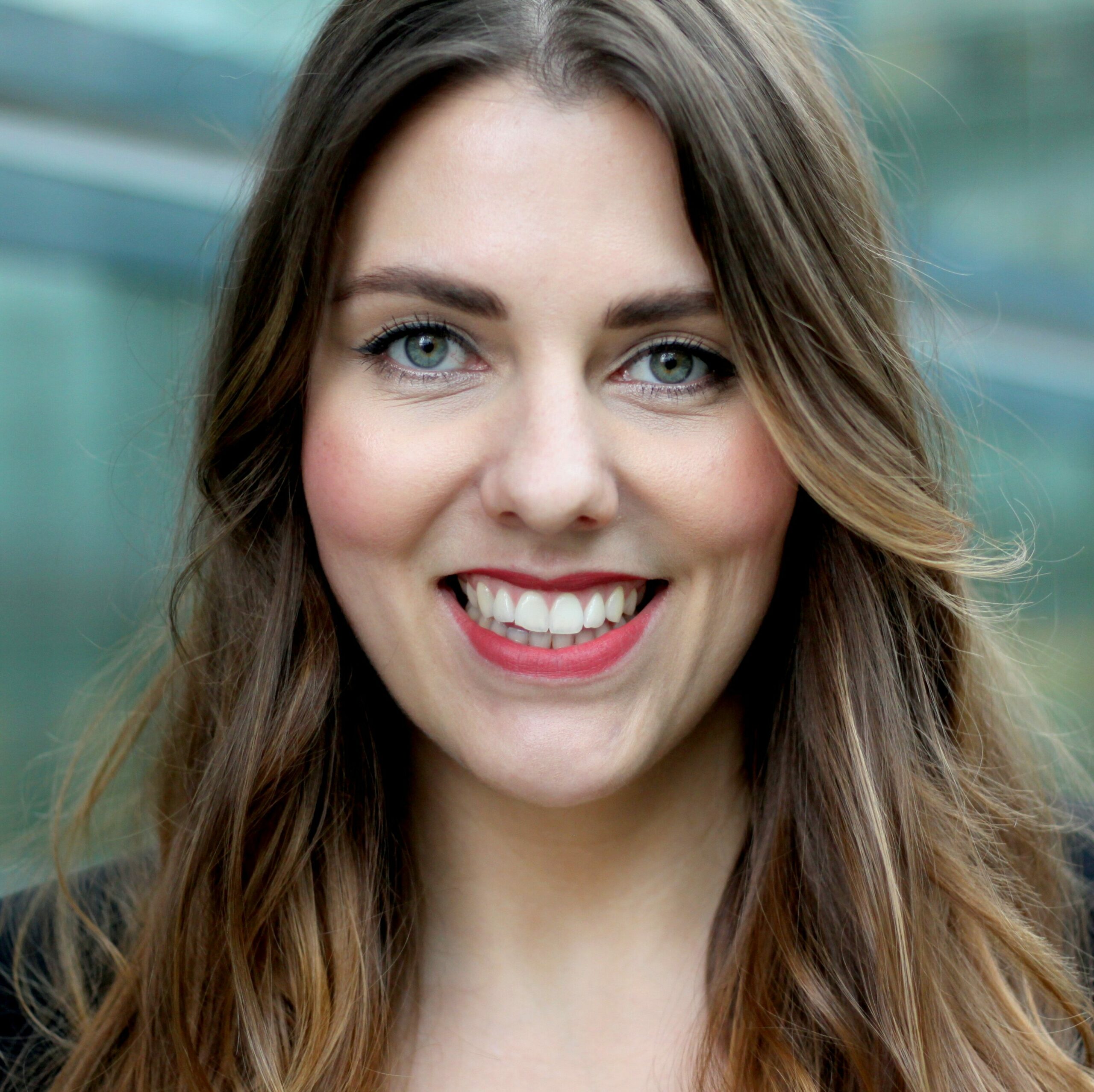
Teresa Pieper – Management Consultant
Hello, my name is Teresa (she/her) and I work as a business consultant in financial services. I was 30 years old when I realized that I was attracted to people regardless of their gender.
I’ve never been uncomfortable with men, and that’s the reason I didn’t realize I was also attracted to women and other genders.
With greater visibility of people identifying as bisexual, I would have been able to recognize it much sooner and thus feel like it was a serious sexual orientation and not just “a phase” or “being confused.” Role models and a general acceptance of bi-sexuality are so important for us to show that sexuality is not just either straight or gay.
An inclusive and informative work environment helps me be myself, continue to learn, educate colleagues and friends, and feel safe when facing clients. I know my employer always has my back.
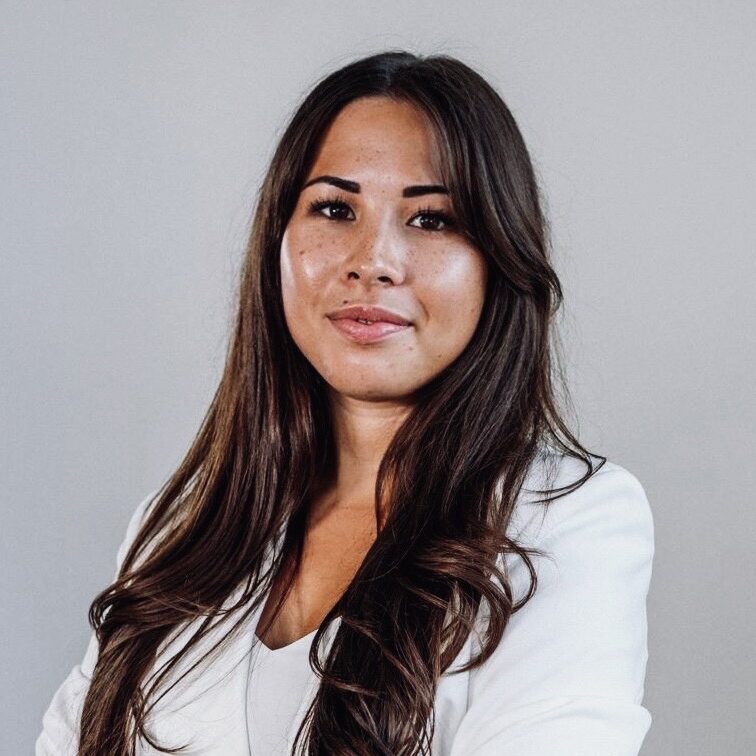
Vanessa Zimmermann – Executive Support Analyst
I wish those around me had taken it seriously and not just declared it as a “phase”. Most people were surprised and the instant reaction was usually, “You don’t look like that” – which can be frustrating.
Bisexuality is not the most present topic in the LGBT+ community, most people are open to it, but I often get negative comments like, “You need to make up your mind” or “It’s just not the real thing” – people just don’t take it seriously. For the same reasons, I was pleasantly surprised to hear about our local celebration of Bisexual Visibility Day. Some people don’t know any better, and these venues can help us raise awareness to keep moving forward toward a more inclusive work environment.
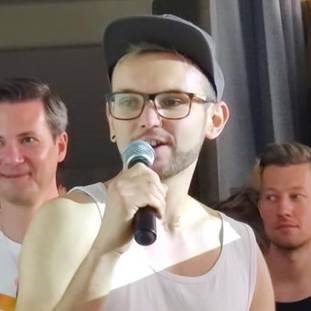
Felix Steinhardt – Digital Business Consultant
As PRIDE Lead Germany, one of my tasks is to support all members of our community as much as possible. For me, the importance of visibility is fundamental to creating a closer connection to our members and their stories. As a bisexual person, I know that sometimes it can be hard to resist the labels that others want to put on us, but hey…. there’s nothing like being proud of who you are!
Our commitment to diversity is felt everywhere and helps our teams create innovative solutions. No one has to pretend – mutual respect and empathy make us one big family.

Timona Borhanuddin – Technology Strategy & Advisory
I was born in Hamburg. However, when I was six years old, I moved back to Bangladesh with my family. Due to the cultural and traditional norms in Bangladesh, I was confronted with many stereotypes as a child and teenager. I was taught how to be the perfect housewife for a man, and that you have to get married to make your parents proud. It was not easy to break all these stereotypes.
Today, I am OUT, LOUD, and PROUD of the fact that I am successful professionally, that I stand by my bisexuality, and that I have accomplished everything on my own terms. Stereotypes are set by society, and we can overcome them if we believe in ourselves and are open about it.
Before coming to Accenture, I worked at a smaller consulting firm where I didn’t feel like I could be myself. I didn’t dare talk openly about my sexual orientation or LGBT+ issues at my previous employer. That’s all the more reason why, when I changed employers, I made sure I was seen as a person. I firmly believe that we all work better and are more successful as a team when we create an open and tolerant environment where we can respect each other and all be ourselves.
At Accenture, you are motivated and supported to bring your authentic self to the workplace.If that means talking about your sexual orientation, you should be able to do so easily.
Accenture promotes an inclusive workplace and creates an environment where everyone can develop and flourish and be themselves to the best of their ability with special LGBT+ training, mentoring programs and a modern understanding of leadership and open exchange.
The statements are based on the personal experiences and opinions of employees and therefore do not reflect the opinions of Accenture or Bayer.
TIPS AND RECOMMENDATIONS
A talk with… Dr. Ariane Reinhart
“For us, an open working environment – regardless of personal differences such as sexual orientation, gender identity or origin – is a matter of course.”
You support the Out Executives as a member of the jury. Why is that topic important to you?
Dr. Ariane Reinhart: At Continental, diversity is part of our DNA and a catalyst for our innovative power. Only the diverse perspectives, characteristics, experiences and cultures of our employees make our company innovative. For us, an open working environment – regardless of personal differences such as sexual orientation, gender identity or origin – is a matter of course. As long as there is conscious or unconscious exclusion in our society, we will be fully committed to promoting the inclusion and support of our LGBT*IQ colleagues.
At Continental you have a standardized procedure in the application process, so that no prejudices are introduced when selecting candidates. What actions are taken to also reduce prejudice against LGBT*IQ-topics in the workforce?
Dr. Ariane Reinhart: Appropriate trainings and initiatives worldwide show our employees that diversity in all its facets is a matter of course, forexample, that the topic is given enough space. This includes Diversity Days at Continental, which as awareness events convey the different dimensions of diversity at our locations and highlight the importance of the topic around the world. In our current 28 Diversity Networks we aim to strengthen and make our diversity visible, to exchange views and to promote mutual understanding.
Continental operates globally. How do you rate the implementation of diversity in Germany, compared to other countries in which you are operating?
Dr. Ariane Reinhart: Comprehensive diversity management in companies is becoming increasingly recognized – and this applies worldwide. Although our economic and social environment is constantly changing, a profound cultural change – and that is what we are talking about in the appreciation and inclusion of diversity – takes time. Realizing and appreciating the added value of diversity requires a change in our mindset. We are taking the necessary clarity and rigor against discrimination of any kind, and, as a company, we have committed ourselves to this and will continue to do so.
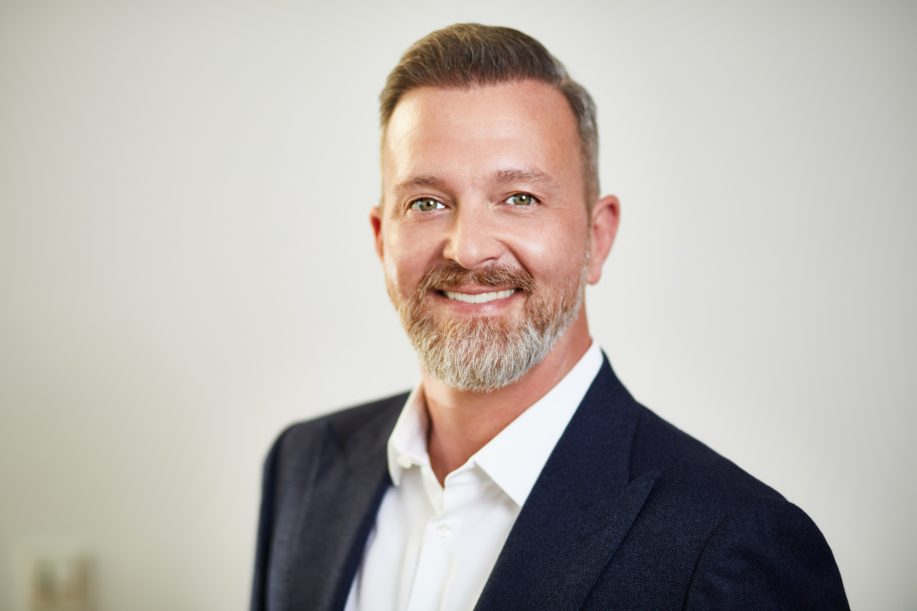
A talk with… Matthias Weber
“For me, visibility is one of the most effective instruments for creating acceptance.”
What does the visibility of LGBT*IQ have to do with leadership?
Matthias Weber: Modern management methods are based on the goal of fair treatment, appreciation and development of all employees. The fact that we are still a long way from achieving such an inclusive and diversity-oriented working and management environment is shown not only by actually measurable quotas of women, but also by the results of representative studies: LGBT*IQs too often feel discriminated against and therefore largely prefer not to come out at the workplace. And here we are on the subject of visibility: for me, visibility is one of the most effective instruments for creating acceptance. Here leadership has a relevant meaning: starting at the top of the company, as “tone from the top” and then through all management levels, the company’s claim that all employees are equally valuable, measured according to their performance and promoted according to their potential must be made clear.
You advocate a holistic Diversity Management instead of a deficit-oriented approach at antidiscrimination – what are the most important differences between these approaches?
Matthias Weber: Deficit-oriented anti-discrimination approaches are mostly aimed at individual measures. Nevertheless, the legislator aims to prohibit discrimination here. This is a statement and important as a political signal, just as it is necessary as a legal basis for those affected. But from my point of view, it is important to work to ensure that discrimination does not arise – and that is because people’s attitudes towards each other are respectful and mutually accepting. This is where holistic diversity management can offer effective strategies in both public and private companies.
In Germany, a large part of LGBT*IQ-community still decides not to come out at the workplace. What is the difference to other countries – what is done better there? What can we learn from that?
Matthias Weber: According to my opinion, this is essentially a question of culture, society and personal self-conception. In France, around 60 per cent have their coming out at the workplace, despite the fact that the fear of being disadvantaged in working life is greater. The deeply rooted urge for freedom and self-determination, no matter what the cost, is more pronounced in our neighbours than in Germany, and there are countless examples of this on both sides. Our state structure as a non-secular state also plays a not inconsiderable role in this context. All we can do is intensify our work, and the everlasting key is visibility at all levels – no matter what the cost.

A talk with… Matthias Weber
“For me, visibility is one of the most effective instruments for creating acceptance.”
What does the visibility of LGBT*IQ have to do with leadership?
Matthias Weber: Modern management methods are based on the goal of fair treatment, appreciation and development of all employees. The fact that we are still a long way from achieving such an inclusive and diversity-oriented working and management environment is shown not only by actually measurable quotas of women, but also by the results of representative studies: LGBT*IQs too often feel discriminated against and therefore largely prefer not to come out at the workplace. And here we are on the subject of visibility: for me, visibility is one of the most effective instruments for creating acceptance. Here leadership has a relevant meaning: starting at the top of the company, as “tone from the top” and then through all management levels, the company’s claim that all employees are equally valuable, measured according to their performance and promoted according to their potential must be made clear.
You advocate a holistic Diversity Management instead of a deficit-oriented approach at antidiscrimination – what are the most important differences between these approaches?
Matthias Weber: Deficit-oriented anti-discrimination approaches are mostly aimed at individual measures. Nevertheless, the legislator aims to prohibit discrimination here. This is a statement and important as a political signal, just as it is necessary as a legal basis for those affected. But from my point of view, it is important to work to ensure that discrimination does not arise – and that is because people’s attitudes towards each other are respectful and mutually accepting. This is where holistic diversity management can offer effective strategies in both public and private companies.
In Germany, a large part of LGBT*IQ-community still decides not to come out at the workplace. What is the difference to other countries – what is done better there? What can we learn from that?
Matthias Weber: According to my opinion, this is essentially a question of culture, society and personal self-conception. In France, around 60 per cent have their coming out at the workplace, despite the fact that the fear of being disadvantaged in working life is greater. The deeply rooted urge for freedom and self-determination, no matter what the cost, is more pronounced in our neighbours than in Germany, and there are countless examples of this on both sides. Our state structure as a non-secular state also plays a not inconsiderable role in this context. All we can do is intensify our work, and the everlasting key is visibility at all levels – no matter what the cost.
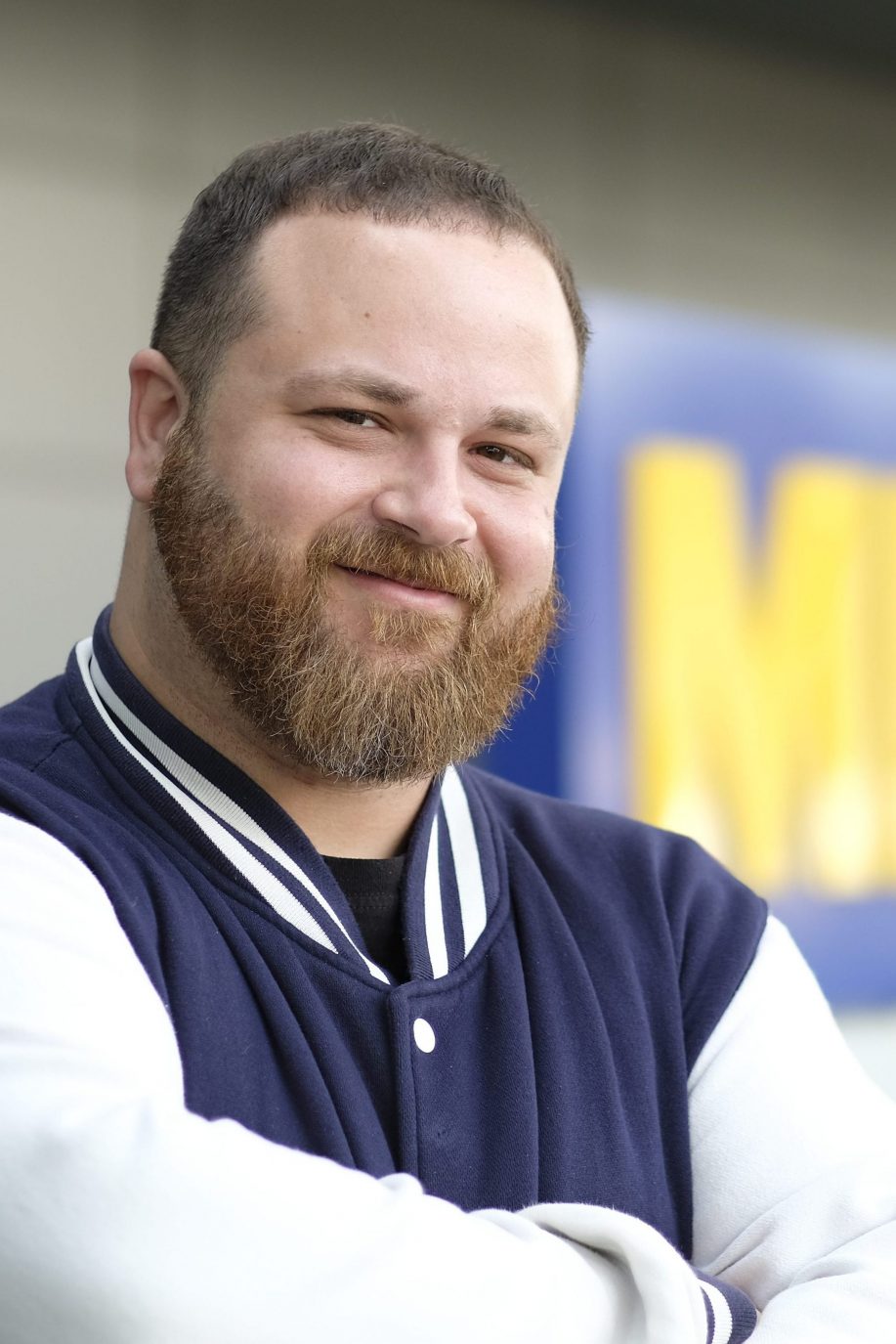
First place, GERMANY’S TOP 50 LGBT+ Voices 2020
“I want to maintain a daily dialogue about LGBT+ because unconscious bias is something that affects everyone. The more visibility I can give the subject, the more we will become aware of our unconscious thoughts.”
After studying logistics management, Nikita Baranov began his career in the commerce sector and was responsible for external IT partners and innovations at METRO AG from 2015 to 2020. He has been Executive Assistant to the CHRO since July 2020. In addition, as a spokesperson for the LGBT+ employee network METRO Pride and a core member of the women’s network WiT, Nikita promotes cultural change in order to make workplaces even more open.
Why are you involved in this topic at work?
Nikita Baranov: I want anyone who works for us or with us not to have to ask themselves the energy-sapping questions “Should I come out?” and “How much should I reveal about myself?” – I want them to be able to be who they are, with their entire identity. To come to work without having to fear being harassed, bullied or discriminated against just because of who they are. Not only to be diverse and integrated, but also to have a feeling of belonging.
What responses do you get to this?
Nikita Baranov: I get positive responses to my involvement, but I also notice that the topic of LGBT+ is not always considered an integral part of Diversity & Inclusion by all employees. That’s why we need to continually raise people’s awareness because only a diverse workforce can meet our goal of producing creative and innovative solutions for our equally diverse customers.
What can we all achieve by getting involved in LGBT*IQ networks?
Nikita Baranov: I’m convinced that only by joining forces will we manage to eliminate discrimination at work in order to promote equal rights. Networks help us increase visibility, and company-wide projects have a bigger reach and significance. One thing is certain: we’re all fighting for a common cause, and alliances can only be beneficial.
Since July, you have been Executive Assistant to the Chief Human Resources Officer at METRO AG – will this enable you to make LGBT*IQ topics even more visible?
Nikita Baranov: Above all, I firmly believe that, regardless of role or position, everyone has a voice and a platform that they should use to promote LGBT+ topics. As LGBT+ diversity is a key part of our corporate culture, I’m happy to be able to make the topic even more visible.
You’re often seen with a rainbow – what does it mean to you to be out and visible?
Nikita Baranov: I want to maintain a daily dialogue about LGBT+ because unconscious bias is something that affects everyone. The more visibility I can give the subject, the more we will become aware of our unconscious thoughts. Being out at work and not having to hide my identity is a prerequisite for showing myself as a whole person and performing at my best.
The interview was conducted as part of GERMANY’S TOP 100 OUT EXECUTIVES. This list is a joint project with the UHLALA Group and is now available online.
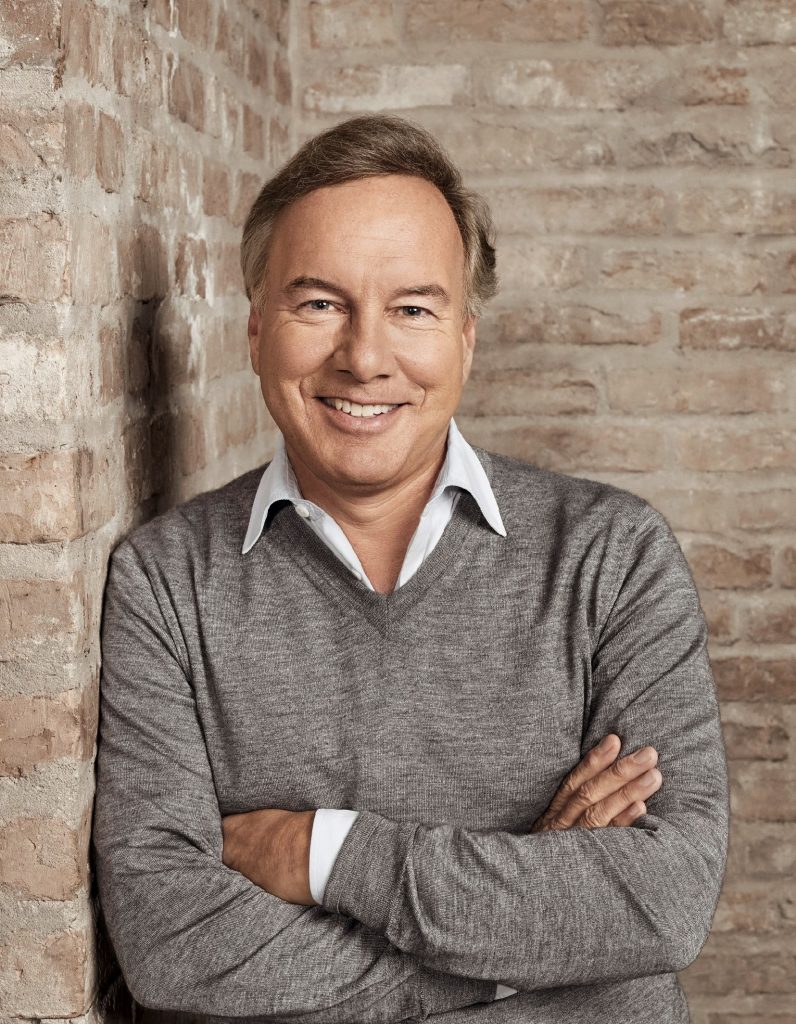
First place, GERMANY’S TOP 100 OUT EXECUTIVES 2020
“Managers shape a company’s culture. The more openly we practice diversity, the more open our dealings with each other become.”
Nico Hofmann, who was born in Heidelberg in 1959, is one of Germany’s leading film and television producers and CEO of UFA. He has been responsible for some of the most successful films and series of the past two decades. Together with Bernd Eichinger, Nico Hofmann launched the young talent award FIRST STEPS in 1999. He has won numerous national and international awards for his work as a director and producer.
Nico Hofmann, many congratulations on being ranked no. 1 in GERMANY’S TOP 100 OUT EXECUTIVES list. You were already on the list last year – what responses did you receive as a result of that?
Nico Hofmann: Thanks! I’m delighted, although I see the list of Out Executives as more of a platform for dialogue than just a ranking. After I was ranked 12th last year, I was able to create lots of contacts with other colleagues from the list. That’s very valuable. It’s important to make diversity visible and the Out Executives list is a very interesting way of doing that.
Being out at work – what does that mean in a leadership position?
Nico Hofmann: Managers shape a company’s culture, so the significance shouldn’t be underestimated. However, the need for diversity and the energy come primarily also from the employees themselves. The younger generation in particular are making very strong calls for this – something we have a keen sense of at UFA. The company has changed in the past five years, becoming much more female and much younger. And the more openly we practice diversity, the more open our dealings with each other become. Today we discuss things differently and cast roles differently as well. UFA’s parent group Bertelsmann has the be.queer network, which we became part of by creating be.queer@UFA. Here, too, a lot of the initiative stemmed from our employees.
Nevertheless, the German film industry in particular could still do a lot more about diversity. How do you see your own role here?
Nico Hofmann: I very clearly have a political agenda. I appear in the media and talk about the subject. Germany is about five years behind the USA in this area, but things are moving. Together with the media industry magazine DWDL.de, we had planned to hold a diversity summit for the film industry in Cologne this year. Unfortunately, it had to be cancelled due to the coronavirus pandemic. But the summit will take place next year because the demand for it was very strong. The major channels had confirmed their attendance, the tickets were quickly sold out and big names were set to appear on the panels – that tells me how topical the subject is for the film industry.
LGBT*IQ people still barely feature in German film and television productions, and when they do, they often have very clichéd roles. What is being done to change this?
Nico Hofmann: Diversity has long been visible in our daily dramas such as “GZSZ” (“Good Times, Bad Times”), and we have currently begun filming our queer series “All You Need” for the public channel ARD – this wouldn’t have happened a few years ago. If we show LGBT*IQ people as a perfectly normal part of films and series without turning them into victims or resorting to clichés, my hope is that, in society as a whole, they can develop their own self-identity because this has become an entirely natural thing to do.
What’s more, today we have a different generation of creatives. I teach at the Film Academy in Ludwigsburg and some of my best students there are from minority ethnic groups and approach topics in a completely different way. I’ve also had the opportunity to support the development of several transgender students at the Film Academy and I’m seeing a generation come through that has a very strong need for diversity.
The interview was conducted as part of GERMANY’S TOP 100 OUT EXECUTIVES. This list is a joint project with the UHLALA Group and is now available online.
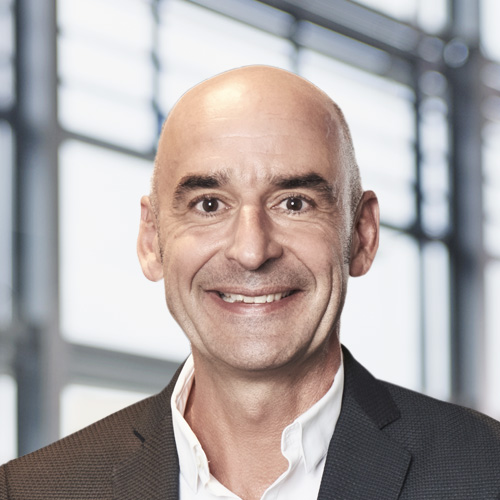
PROUT EMPLOYER Campana & Schott
“Openness and tolerance are here to stay.”
Dr. Christophe Campana is the founder and managing director of Campana & Schott. He has over 25 years of experience in (top) management consulting and is a member of various expert and advisory boards. His main areas of focus include “strategic project and portfolio management” as well as “new forms of collaboration” with a special focus on social collaboration. Dr. Christophe Campana is the author of over 50 publications on the subject of project and portfolio management.
In simple words, Campana & Schott is providing advice to their customers on strategies to keep their finger on the pulse. What role does diversity play here?
Dr. Christophe Campana: Events such as climate change, radicalization, populism, etc. have led to the point that more and more people are concerned with meanings and values. Most people have recognized that “healthy” progress and prosperity cannot be done without moral values and sustainability. Diversity is one of these values and therefore an essential part of this overarching development. Excluding people due to their sexual orientation promotes hatred and prevents a sustainable better future for everyone. There is still a lot to be done here.
Campana & Schott received three awards as a “Great Place to Work”. The list of your commitments towards the diversity of your employees is long and you are building on long-term cooperation instead of “hire and fire”. Has the PROUT EMPLOYER cooperation been the last piece of the puzzle for an open and inclusive work environment?
Dr. Christophe Campana: There will probably never be that one last piece of the puzzle. For us, the cooperation with PROUT EMPLOYER is an important part of our commitment, which we are constantly developing further. I keep learning new things, e.g. only recently the Federal President Steinmeier made a very clear point in the context of the anti-racism riots where he said: “It is not enough to not be a racist. We have to be anti-racists.” This view also applies to me with regard to diversity and our corporate culture. I am convinced that in the future there will always be topics that managers should deal with in the interests of their company: openness and tolerance are here to stay.
“I understood that as an entrepreneur you have to take a visible and public position on this in order to reach out to the community and signal: Live your sexuality as you want: openly or not – both are fine.”
What advice would you give to companies that are just starting their commitment to LGBT*IQ diversity?
Dr. Christophe Campana: At Campana & Schott there have always been employees who have lived out their homosexuality openly. Therefore, homophobia had no place in our company. For a long time, I believed that this was enough. Only later, I understood that as an entrepreneur you have to take a visible and public position on this in order to reach out to the community and signal: Live your sexuality as you want: openly or not – both are fine. But if you want to live it openly, you will not suffer any disadvantage in our company. It’s just a small step, but it does a lot – and only good.
From our experience we know that LGBT*IQ diversity has the greatest impact in a company when executives, diversity management and the company’s corporate networks regularly come together. Is that also your recipe for success?
Dr. Christophe Campana: Yes, I myself regularly meet with our LGBTQ+ network and have learned a lot from these meetings, e.g. the so-called “Monday lie”, when colleagues chat with each other during the coffee break about the last weekend and some prefer to describe their life partner as “a friend”.
I could immediately emphasize the stress associated with this white lie when my employees told me that they had felt like this for very long periods of time, sometimes even years. That is why the close exchange is so crucial: You start to better understand the problems of the community and can actually start changing things more targeted.
The last question: There are turbulent times coming for employees. Considering your commitment to diversity, how would you react to the statement that starting from now, there are more important topics than LGBT*IQ diversity?
Dr. Christophe Campana: There is a difference between the urgency and the importance. The unexpected severity with which the corona pandemic has affected all areas of life resulted in existential challenges for many companies which we will have to deal with. Just because you douse a fire in an apartment doesn’t mean that your general life in the apartment becomes unimportant. This crisis overshadows many issues, which, however, do not become irrelevant – on the contrary: I am convinced that companies with an open and appreciative culture will get through the crisis better. Diversity is an essential part of corporate identity and contributes to the performance and resilience of an organization.
Dear Dr. Campana, thank you for talking to us!
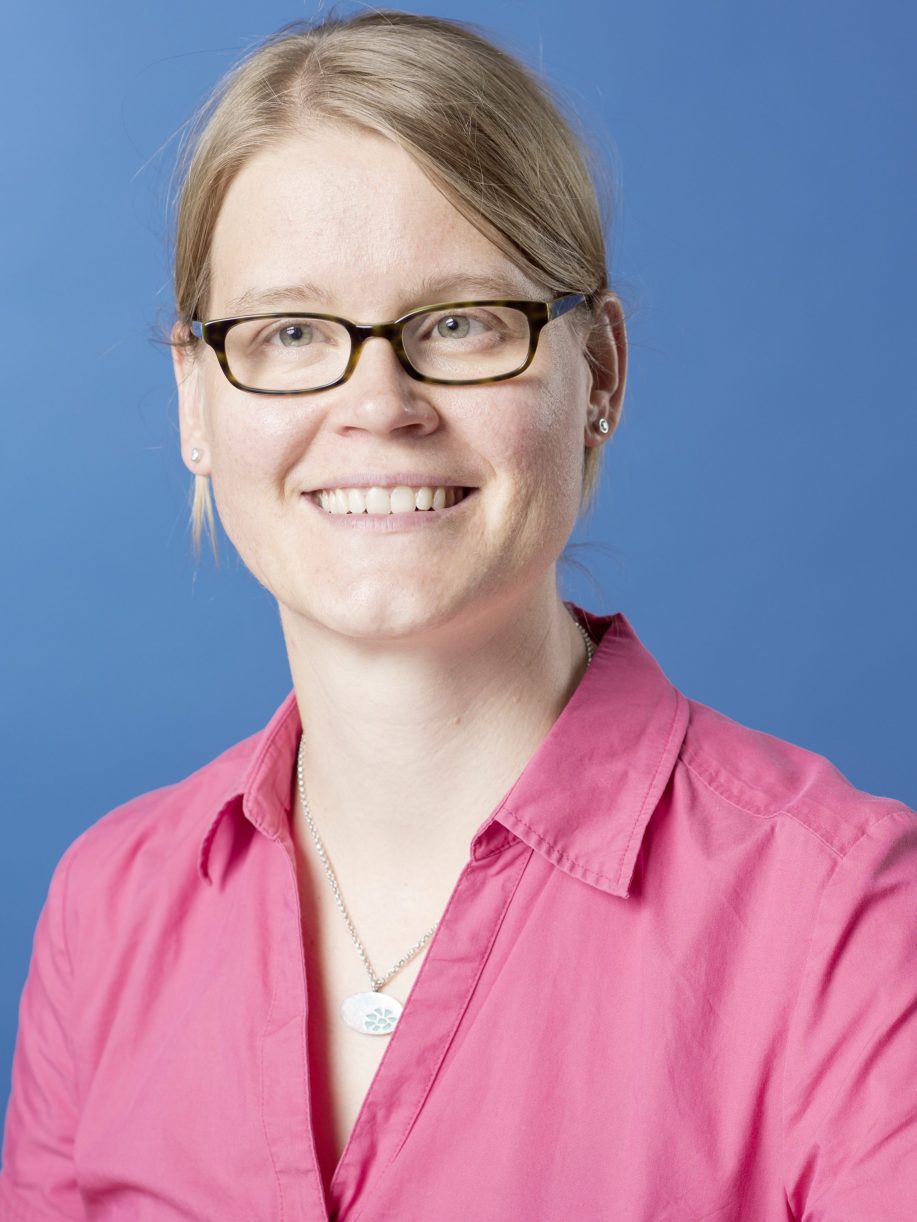
PROUT EMPLOYER Google Germany
“We support you! Now and always! That’s what PROUT EMPLOYER says, and that’s why it’s important to us at Google.”
As Director of Client Solutions, Dr. Jannika Bock is responsible for the sale of Google’s advertising products to major customers in Central Europe. She is the Exec Sponsor of GayglerDE, the LGBTQ+ Community at Google Germany GmbH. Before Jannika switched to Google in 2008, she worked, amongst others, for Axel Springer AG. She did her PhD in American literary and cultural studies, i.a. at Harvard University, and is a member of the digital advisory board of TAKKT AG.
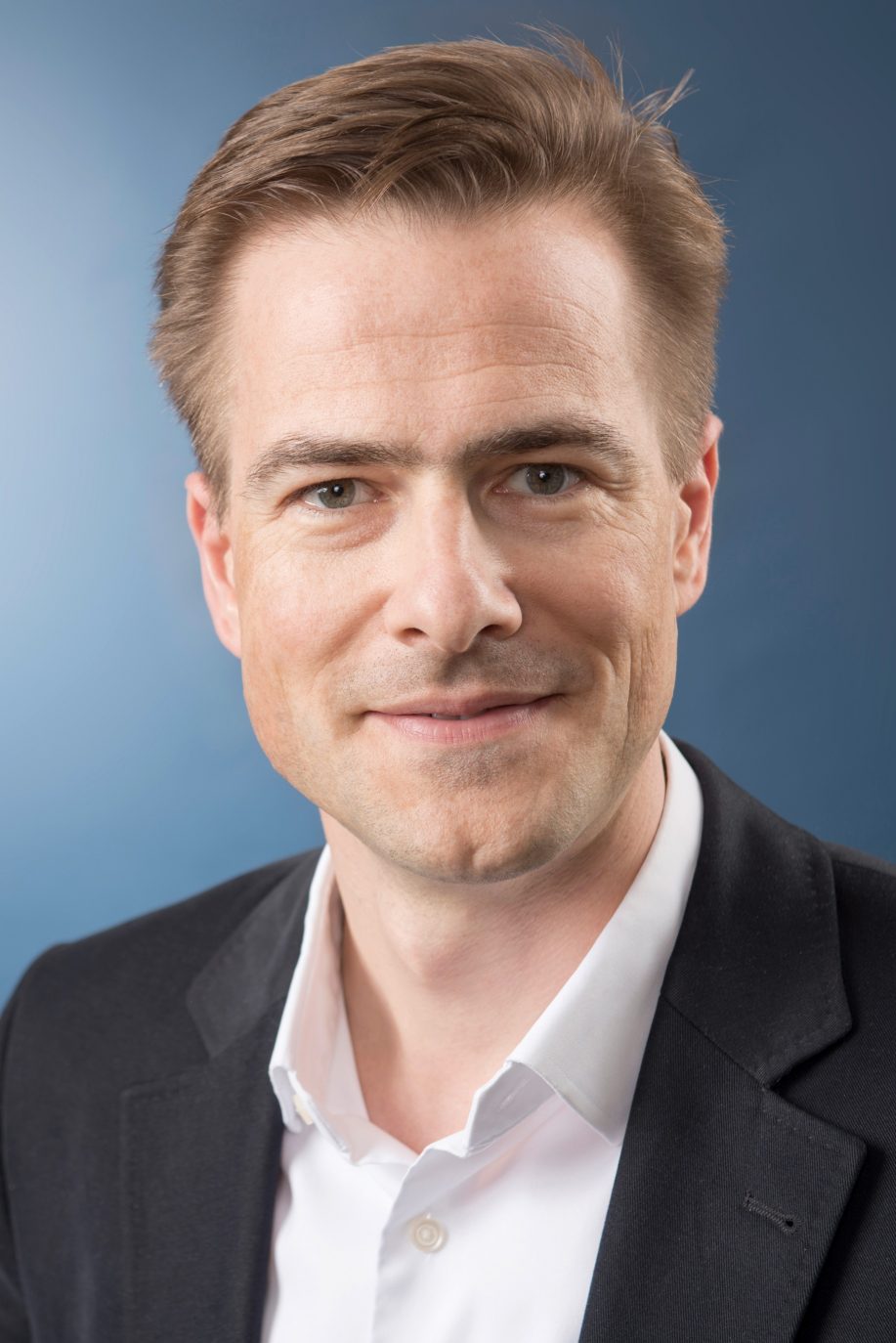
“We want to be a company that promotes diversity and lives integrity and inclusion.”
As Vice President of Central Europe, Philipp Justus heads Google’s business in 36 countries, including Germany, Austria, Switzerland and the CEE countries. Before joining Google in 2013, Philipp was CEO of Zanox, the Berlin performance marketing network, and held various management positions at eBay and PayPal, including VP of Europe, SVP of Auctions and SVP of Global Markets. Philipp studied business administration at WHU in Koblenz and received an MBA from the Kellogg School of Management at Northwestern University.
As a sponsor and member of the foundation’s advisory board, Google has been associated with PROUT AT WORK since the beginning. Why did you decide to become a PROUT EMPLOYER?
Jannika Bock: Currently, it is important to demonstrate to the public that we at Google advocate equality for people in the LGTBQ+ community. This year, the CSD parades were canceled in Germany. As a result, a lot of visibility got lost. We would like to work against this: We support you! Now and always! That’s what PROUT EMPLOYER says, and that’s why it’s important to us at Google.
In order to keep setting new goals as well as keep up with diversity & inclusion, Google also relies on the possibility of self-identification, e.g. as trans *, non-binary or LGBT*IQ. Can data really depict the people behind your employees?
Philipp Justus: We want to be a company that promotes diversity and lives integrity and inclusion. We want our employees to picture the diversity of our users – this is the only way we can develop products that are actually accessible and usable for everyone. We want to create an environment for our employees in which they affiliate themselves with. This includes demonstrating the diversity of our workforce which is, for example, possible through the process of voluntary self-identification.
“In Germany there are still many, many people who cannot be themselves at work.”
Covid-19 somehow surprised all of us and we now have to deal with it. In your opinion, why does diversity and especially LGBT*IQ diversity has to remain in the focus?
Philipp Justus: In this PRIDE season, digital media have been more important than ever – for the first time, on YouTube with PRIDE LIVE there was a German-wide, completely virtual PRIDE event on June 27th 2020, attended by politicians, companies(such as Google), and many activists from the scene. There has been a space created to come together – a space that, unfortunately, couldn’t be on the streets this year.
Where do you see the major challenges for LGBT*IQ in the workplace in the coming years?
Jannika Bock: In Germany we often encounter the fast assumption that everything has been achieved and that there would be no discrimination against members of the LGBTQ+ community anymore – especially not in companies that actively campaign for greater diversity. However, this does not correspond to reality. In Germany there are still many, many people who cannot be themselves at work. There are people who hide their (sexual) identity from colleagues and superiors – for fear of discrimination and who are exposed to “micro aggressions” in form of taunts and hidden jokes. That has to stop!
Dear Jannika Bock, dear Philipp Justus, thank you very much for the interview!
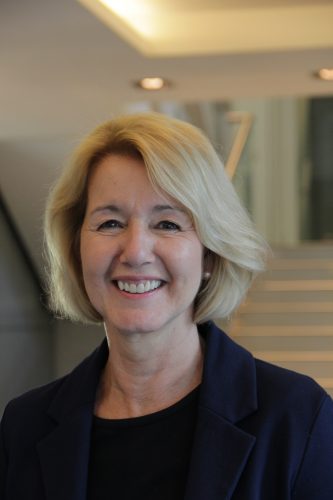
PROUT EMPLOYER REWE Group
“We are best able to solve a task when we view it from multiple perspectives.”
Dr. Petra Meyer-Ochel (62), born on the Lower Rhine, graduated with a PhD in business administration from Cologne University. She then worked in personnel and management development for various retail companies, followed by 11 years as a freelance consultant. Since 2015 at REWE Group, responsible for the CoE Personnel Development in Retail Germany as well as many topics of the sustainability pillar Employees.
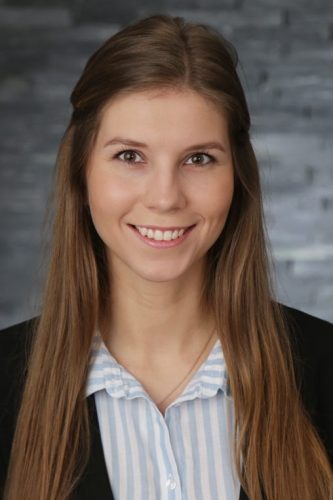
“It’s important to us to accommodate the interests, wishes and ideas of all our employees […].”
Kaja Gut (27), born in Frankfurt am Main. Studied in Darmstadt, graduating in 2019 with a master’s degree in psychology with specialisations in business und personnel psychology as well as occupational and engineering psychology. Has been working for the Employer Branding team at REWE Group Headquarters in Cologne since 2019, where she is responsible for REWE Group certifications, among other things.
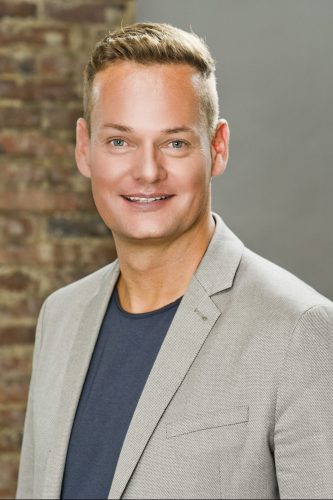
“Without all those supporters all the way up to the executive level, a network like di.to.”
Frank Bartels (46), born in Lower Saxony, trained as a hotel manager in Hamburg before moving to Cologne in 1998 where he has been working for REWE Group for over 21 years. Responsible for event & travel management. In 2013, he initiated the LGBT network di.to. (different together) within REWE Group and is one of its two spokespeople. The network comprises about 300 employees nationally and exists in both Germany and Austria.
Top Employer in Germany with an extraordinary focus on employees for six years in a row, certified as a top training provider with the BEST PLACE TO LEARN label and recognised as an employer with a focus on balancing work and family. Was the REWE Group’s step to become a PROUT EMPLOYER a logical consequence? What motivated REWE to do so?
Katja Gut: It’s important to us to accommodate the interests, wishes and ideas of all our employees, regardless of gender, nationality, ethnic or social background, religion/beliefs, disability, age or sexual orientation. For us, focusing on our employees is essential, so we’re always looking to add further programs to our portfolio that could be helpful to our employees as well as potential applicants. As a PROUT EMPLOYER, we now have taken another important step, including with regards to supporting and positioning our LGBT network di.to (di.fferent to.gether).
What are your goals for the PROUT EMPLOYER cooperation?
Katja Gut: Through our network di.to, we are already actively promoting more tolerance and acceptance in the workplace, regardless of sexual orientation. We expect the PROUT EMPLOYER cooperation to add new input in this area, help extend our network and allow us to work on innovative ideas together. We are looking forward to learning new things, exchanging views with employees from other industries and sharing experiences. It’s great to meet like-minded people who support LGBT projects with the same passion we do.
“It’s important to us to be able to work as transparently as possible and keep drawing attention to our campaigns and events wherever we can: for example, involving all our colleagues at REWE Group in our participation at the 2019 Cologne CSD.”
Petra, you believe that the teams of the future will be mixed and diverse and you align your strategies accordingly. How is this idea being lived at REWE Group? And how can LGBT*IQ talents benefit from this philosophy?
Dr. Petra Meyer-Ochel: At REWE Group, we have mixed teams in our supermarkets as well as in our central locations – professionally, individually and with regards to the above-mentioned diversity dimensions. We are best able to solve a task when we view it from multiple perspectives. And you get these multiple perspectives when you make sure your teams are diversified. To start with, this often means more effort because all the different opinions need to be heard and exchanged. Communication is more complex as well, for example when a colleague from Retail sees things differently from someone who works in administration. But it always pays off in the end. Mixed teams frequently debate and discuss ideas that wouldn’t even have come up in a more homogeneous team. I am firmly convinced that diverse teams are more creative and make better decisions in the long term.
LGBT*IQ talents can benefit just like anyone else: openness for other people’s ideas, mutual respect and results that have been achieved together strengthen both the individual and the entire team.
Frank, in REWE’s advocacy for equal opportunities for LGBT*IQ, network and executive level work closely together, with numerous supporters in between. Is that the secret recipe for LGBT*IQ diversity within the company?
Frank Bartels: Yes, absolutely. Without all those supporters all the way up to the executive level, a network like di.to. wouldn’t have any clout whatsoever. Shortly after the network was founded in 2013, our current CEO and then-director Lionel Souque became our patron. That gave our network tremendous momentum and opened every door within the REWE Group. However, it should also be noted that acceptance within our company was – and still is – huge from the beginning and we we’ve always been able to approach various contact persons within REWE Group with our concerns at any time. It’s important to us to be able to work as transparently as possible and keep drawing attention to our campaigns and events wherever we can: for example, involving all our colleagues at REWE Group in our participation at the 2019 Cologne CSD. We don’t want to be on the sidelines, but we don’t want to be perceived as an elitist group either. So the 2019 CSD motto “Many.Together.Strong.” unwittingly became a maxim for working together at REWE Group.
From your perspectives, what advice would you give companies who are at the very beginning of their work for LGBT*IQ diversity?
Frank Bartels: As discussed, backing from an executive or from other straight allies is essential as far as LGBT networks are concerned. It gives you support, strength and self-confidence, in particular while the network is still in its infancy. Outwardly, LGBT/diversity should be an issue close to your heart, i.e. an issue that you’re comfortable promoting throughout the entire year rather than pinkwashing during Pride season. The fact that we display rainbow stickers at the entrances to our REWE and PENNY supermarkets, our toom hardware stores and our DER travel agencies positions us very credibly in this regard.
Thank you very much for the Interview!

A talk with… Matthias Weber
“For me, visibility is one of the most effective instruments for creating acceptance.”
Nikita, congratulations on you birthday also from our side. Why os a donation campaign for the PROUT AT WORK-Foundation so important right now, in times of crisis?
The answer to crises lies in togetherness – precisely because of the physical distance we experience in everyday life, it is all the more important that we move closer as a community. Of course, this also applies to our working environments. One thing is clear, we will all work together differently in the future, and the Foundation is working tirelessly to achieve this: For a working world that stands for more diversity and inclusion – detached from sexual orientation, origin, religion and identity.
What is the added value of PROUT AT WORK for you as a person?
Without the long-standing support of PROUT AT WORK, METROPride, our network for LGBT+ employees and allies, would not be where it is today. The numerous formats that PROUT AT WORK offers – from guidebooks to awareness training for all levels in the company to important networking with other company networks, politicians and associations – have enabled us to sustainably anchor the topic of LGBT+ diversity within METRO and to constantly expand it.
“One thing is clear, we will all work together differently in the future, and the Foundation is working tirelessly to achieve this.”
What can each individual do to help PROUT AT WORK not just during this time?
Everyone can use PROUT AT WORK’s analog and digital offerings to promote a discrimination-free workplace and more diversity in their company. Especially now, in a time where a lot of conversation only takes place via digital channels, an appreciative environment and mindfulness is more important than ever. In order to promote dialogue and raise awareness of these issues, the Foundation relies on all the support it can get.
